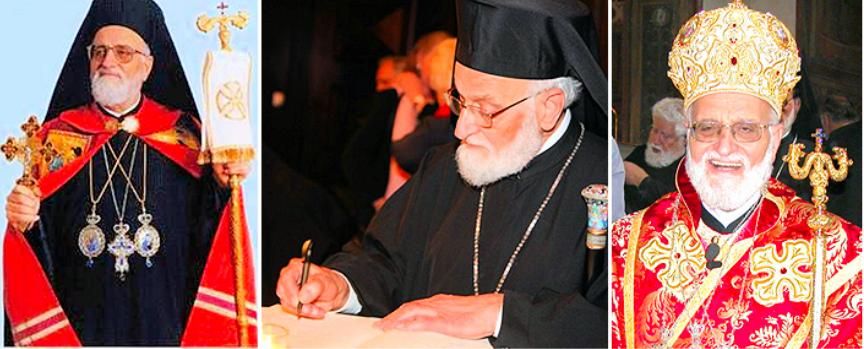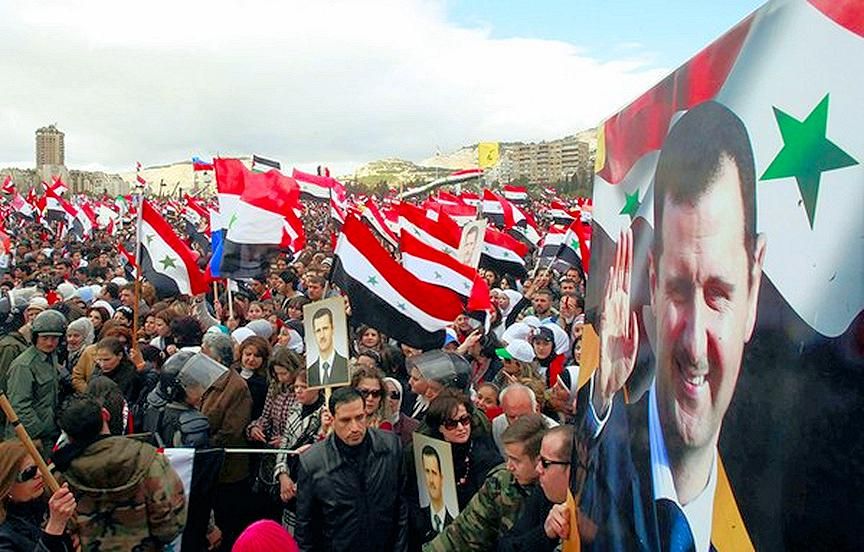
 Pope meets Syrian Patriarch:
Pope meets Syrian Patriarch:
Possible scenarios for Assad regime
among topics of discussion
Syrian prelates appear compelled to be pro-Assad
for fear of an Iraq-like Christian exodus out of Syria
by Alessandro Speciale
Translated from the Italian service of

VATICAN CITY, March 15 - Pope Bene+dict XVI and His Beatitude Gregorios II Laham, Patriarch of Antioch of the Greco-Melkites, had a private meeting at the Vatican Thursday morning.
 [The Patriarch, born 1933, was elected to his position in November 2000. The Melkites, or Byzantine (Greek) Catholics of Middle Eastern origin, are descendants of the early Christians of Antioch (cf. Acts 11:26). As Rome was the most powerful city in early Western Europe and spread her manner of worship throughout the surrounding area, so too the Greek capital, Constantinople (originally called Byzantium), spread her traditions and customs to the countries closest to her. Therefore, the Melkites use the Byzantine Liturgy of St. John Chrysostom. Today the term Melkite is used to refer to those Catholics whose ancestry is Middle Eastern and who follow the Byzantine Tradition in worship, theology, and spirituality. There are about 1.6 million Melkite Catholics throughout the world.]
[The Patriarch, born 1933, was elected to his position in November 2000. The Melkites, or Byzantine (Greek) Catholics of Middle Eastern origin, are descendants of the early Christians of Antioch (cf. Acts 11:26). As Rome was the most powerful city in early Western Europe and spread her manner of worship throughout the surrounding area, so too the Greek capital, Constantinople (originally called Byzantium), spread her traditions and customs to the countries closest to her. Therefore, the Melkites use the Byzantine Liturgy of St. John Chrysostom. Today the term Melkite is used to refer to those Catholics whose ancestry is Middle Eastern and who follow the Byzantine Tradition in worship, theology, and spirituality. There are about 1.6 million Melkite Catholics throughout the world.]
Although there was no communique about the meeting, it is easy to assume that the situation in Syria - which this week marked the first anniversary of continuing popular uprisings against the regime of President Bashir Assad - and the regime's violent repression which has taken the lives of some 10,000 citizens so far, was discussed.
The Holy Father has more than once referred publicly to the continuing violence in Syria, offering prayers for the Syrian people and calling on all concerned to settle the conflict with dialog and on the international community to extend humanitarian aid tho those in need.
But in recent weeks, a certain separation has emerged between the position articulated by the Holy See - the Pope, to begin with, and his diplomats, starting with the Nuncio in Syria, Mons. Mario Zenari - and that expressed by the Catholic bishops in Syria. The differences do not seem to be merely in nuances that might be expected from the bishops who have to live in that unstable and divided country.
The Vatican line on Syria - which was reiterated at the rather unsuccessful conference of "friends of Syria' held in Tunisia recently, with the participation of Mons. Michael Fitzgerald, the Vatican observer to the Arab League - may be summarized in Benedict XVI's words after the Angelus prayers last February 12:
I have been following with much apprehension the tragic and growing episodes of violence in Syria. In recent days, they have resulted in numerous victims. I remember the victims in prayer, among whom are children; the wounded, and all who suffer the consequences of a conflict that has become ever more a cause of concern.
I also renew an urgent appeal to put an end to the violence and bloodshed. Finally, I call on everyone - especially the political authorities in Syria - to choose the way of dialog, of reconciliation and of commitment to peace.
It is urgent to respond to the legitimate aspirations of the various components of the nation, as well as to the hopes of the international community that is concerned for the common good of the entire society and the region.
It was yet another appeal for international involvement to resolve the crisis and the need to listen to all the voices in a divided nation, particularly those of the rebels.
Mons. Zenari, the Nuncio in Damascus, has spoken on Vatican Radio several times to denounce the violence committed by the Assad regime, the indiscriminate killing of civilians, including children, particularly in the city of Homs, with victims' corpses then thrown into garbage dumps where it becomes almost impossible to recover the bodies.
But the Church hierarchy in Syria continues to warn about great risks for Christians in case the Assad regime should fall and power should go to Islamist factions.
They point to the experience in neighboring Iraq, where sectarian violence against Christians have led them to leave the country in great numbers, and those who stay have been forced to live in extremely dangerous circumstances within urban enclaves that are almost ghettoes.
The Apostolic Vicar of the Latin diocese of Aleppo, the Franciscan Giuseppe Nazarro told FIDES news agency that Christians have fears and doubts about those who are 'leading' the uprising against Assad. "Our fears are well-founded that the opposition to Assad has been led and manipulated by Islamist interests from the beginning".
[Perhaps this has to be explained further? Who could be more 'Islamist' than the Iranian ayatollahs who have been actively supporting the Assad regime as their open surrogate, providing the government with arms and terrorists? NB: The LA Times article below points out that the majority of Syrians are Sunni Muslims, who form the backbone of the anti-Assad uprising, whereas Assad and his Iranian masters are Shiite.]
Nazarro added that "in a country like Syria, change can require centuries".
Similar positions - which imply a defense of the Assad regime - have also been reiterated by the Chaldean Archbishop of Aleppo, Mons. Antoine Audo, by the Syro-Catholic patriarch Ignace III Younan, by Patriarch Gregorios himself, and by other Syrian prelates requesting anonymity. They all expressed warnings of an imminent 'exodus' of Catholics leaving Syria.
In neighboring Lebanon, the Maronite Patriarch Bechara Rai has also warned of an Islamist victory that would transform Syria into a country with Islam as the state religion, saying that "In the Arab world, there is only one nation which is most like a democracy - and that is Syria".
Meanwhile, the senior Patriarch in the Middle East, Cardinal Ignace Moussa Daoud, 82, is hospitalized in Rome.
On the day that the Holy Father met with the Syrian Patriarch, the UK newspaper Guardian published private e-mails pilfered from the Syrian government showing that Assad himself mocks the promises he has made of democracy and reform.
Here is a helpful wrap-up of the Syrian situation on the first anniversary of the uprisings:
Syria marks anniversary
of uprising against Assad
A year after the revolt began, President Assad shows no sign of easing his grip on power.
Rebels have no plans to back down, leaving Syria at an impasse.
By Patrick J. McDonnell and Paul Richter

March 15, 2012
 Syrians turn out in support of President Bashar Assad during a March 15, 2012, rally at Umayyad Square in Damascus.
Syrians turn out in support of President Bashar Assad during a March 15, 2012, rally at Umayyad Square in Damascus.
BEIRUT - A year into the Syrian uprising, it was not the opposition but the government of President Bashar Assad that made a point of conspicuously marking the anniversary.
Raucous pro-Assad rallies Thursday in the streets of Damascus and other Syrian cities were the latest triumphal signal from a government widely described from outside as besieged or doomed.
While four other Arab autocrats have fallen from power in the last 14 months, the tenacious Assad has managed to hold on — despite a raging revolt that has swept large swaths of the nation and seen armed rebels occupy extensive territory, at least temporarily.
Behind the sense of triumph evident Thursday on the streets of Damascus were recent battlefield victories in the restive provinces of Idlib and Homs, where government troops were able to rout outgunned rebels who had for months occupied "liberated" territory. In the end, the rebels' rifles and homemade bombs were no match for the government's tanks and artillery.
"Even one bullet from a Kalashnikov was responded with by a tank shell," said Mazen Arja, an opposition media activist in Idlib.
Having once anticipated that Assad would make an expeditious exit, officials from Washington and other Western capitals now acknowledge that he could cling to power for quite some time.
In August, President Obama and European allies publicly called on Assad to step down. But despite his government's bloody response to its own people, Western military intervention, which theoretically could speed Assad's departure, seems to be off the table. Any such undertaking would encounter objections from Russia and China, veto-wielding nuclear powers on the United Nations Security Council; the challenge ofSyria's difficult terrain and extensive antiaircraft batteries; and uncertainty about a largely unknown opposition that may include a substantial contingent of Islamist militants.
The Assad government "still has a strong grip" on its security apparatus and can be expected to fight until the end, said one U.S. official who asked not to be identified.
"These guys know there's no way out and there's almost nothing they won't do," said the U.S. official.
Most of Assad's senior leadership — many of them key figures from the president's Alawite sect, an offshoot of Shiite Islam — remains in place despite calls from Secretary of State Hillary Rodham Clinton and others that they join the opposition. Many Alawites have come to view the increasingly sectarian battle as a fight for survival, fearing for their fate if the nation's Sunni Muslim majority seize control.
At the top is a military and intelligence structure set up by Assad's father, Hafez, who was long recognized as one of the most ruthless and cunning of Middle Eastern despots, having brutally crushed a 1980s uprising.
The opposition's evolution from a protest movement to an armed rebellion has posed strong challenges for the security forces, which have lost 2,000 members in the fighting, according to the government. But some say the increasingly violent nature of opposition forces has alienated middle-class Syrians and others fearful of Iraq-style chaos and sectarian violence should Assad fall.
Yet even if things may be looking better for Assad now than a few weeks ago, when armed rebels were literally at the doorstep of Damascus, the long-term outlook for his government's survival remains bleak, many experts say. Assad's power is steadily eroding amid a crumbling economy, diplomatic isolation and an insurgency now schooled in sabotage and roadside bombings, they say.
"He could be around, but extremely weakened," said Emile Hokayem, an analyst with the International Institute for Strategic Studies in Bahrain. "You can't see it in simple black-and-white terms."
Inside the embattled presidential palace, there is undoubtedly relief at the continued global impasse about how to deal with Syria.
New fractures within the already deeply divided opposition haven't helped the anti-Assad cause either. The Syrian National Council, the best-known opposition umbrella group, suffered several major defections this week.
In resigning from the group, eminent dissident Haitham Maleh labeled the council autocratic, not unlike Syria's long-ruling Baath Party, he said. "They don't want to play the democracy side," Maleh said of the council.
But on the ground, Assad faces an opposition unified in one goal: his overthrow.
[Modificato da TERESA BENEDETTA 16/03/2012 08:40]